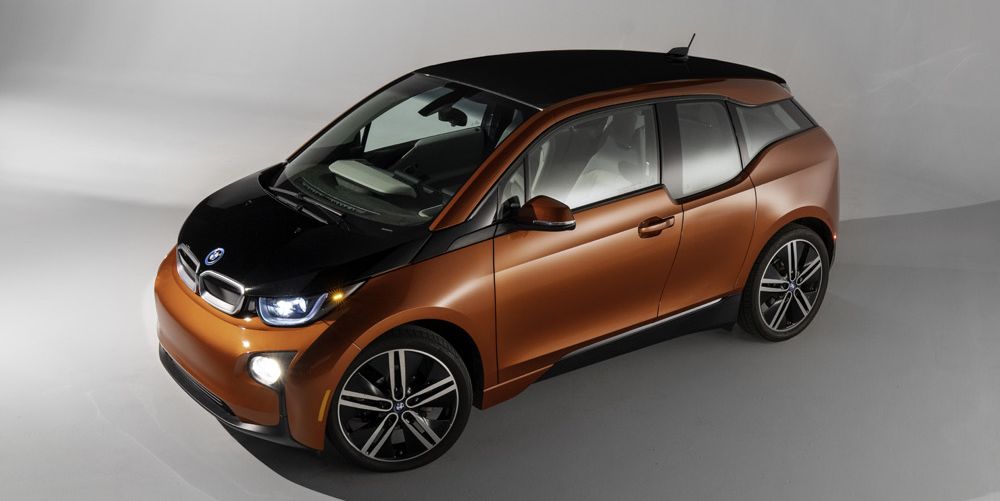What to Buy: 2013–2021 BMW i3

From the July/August 2023 issue of Car and Driver.
BMW’s funky-looking electric i3 never really caught on in the U.S. Its best sales year was 2015, when slightly more than 11,000 of the EVs (including the REx model, the one with the optional range extender) found homes. And yet, its odd looks and practical shape would fit right in with today’s electric cars.
The i3 may have wheels that look like pizza cutters, but there’s nothing cut-rate about it. A carbon-fiber passenger’s cell rides on an aluminum skateboard that carries the suspension, a single motor driving the rear wheels, the battery, and, in the REx version, a small engine borrowed from a BMW scooter. Equally odd is the 2+2-door configuration, and instead of typical materials, interior panels are hemp-reinforced plastics showing off a random fiber pattern.
Ahead of its time when new, an i3 today makes a remarkably affordable pre-owned second car. BMW never gave the i3 a long-range battery. Its smallest battery, found in the 2014–16 i3, offers 81 miles by the EPA’s measure, and its largest, in 2019–21 models, hits 153. If you can live with that kind of range, you’ll love an i3.
“Efficiency, however, is boring. Ambition is exciting. And the i3 has ambition in its soul.” —John Pearley Huffman, C/D, September 2014
Powertrain
All i3 models are motivated by a 170-hp AC motor. In 2018, BMW added an i3s variant, which upped power to 181 horses and came with a firmer suspension tune. Battery size grew twice. After launching with an 18.8-kWh pack, the i3 got a 27.2-kWh pack for 2017 and then a 37.9-kWh unit for 2019. The electric motor has enough torque, 184 pound-feet (199 for the i3s), to feel fleet in traffic, thanks to a curb weight under 3000 pounds. We recorded a sub-seven-second 60-mph time in 2014. The heavier REx, with its 647-cc two-cylinder engine and generator, is a bit slower but gets you a 1.9-gallon safety net (2.3 gallons starting in 2017) that adds another 70 to 80 miles of range.
Value
Because the i3 got a steady flow of running changes (and because these cars are the newest), the 2019–21 i3s have the highest value and can fetch over $30,000. Well-used early models flirt with four-digit pricing, but a clean car with moderate mileage should sell in the teens. DC fast-charging capability was optional in 2014 and standard from 2015, so first-year models without it sell for less.
Problem Areas
Buying an EV with a bad battery is a costly error. Inspect an i3 when the battery is fully charged. If the indicated range is significantly less than the EPA label value, move along. But an eight- or nine-year-old i3 with an indicated max range still in the 70s is probably okay. Pre-2018 cars suffered from drive-bearing failures, which are audible at parking-lot speeds; models from 2018 on have updated bearings. If you value connectivity, avoid early cars (some 2017s and prior), which have obsolete 3G communications. With the REx, ask how often its oil was changed, and even take a look at and smell the oil on its dipstick.
John Roe|Car and Driver

John Roe|Car and Driver
Current Listings (May 2023)
2015 BMW i3 (18.8-kWh battery)
Price: $16,598 Mileage: 10,955
2018 BMW i3s REx (27.2-kWh battery)
Price: $24,759 Mileage: 27,675
2020 BMW i3 (37.9-kWh battery)
Price: $28,763 Mileage: 11,506
(Listings from CarGurus)
2015 BMW i3
170-hp AC motor, direct-drive, 2853 lb
Test Results
60 mph: 6.5 sec
1/4-mile: 15.3 sec @ 86 mph
Top Speed: 92 mph
Braking, 70-0 mph: 163 ft
Roadholding, 300-ft Skidpad: 0.78 g
From C/D, September 2014. Acceleration times adhere to our old rollout rule of 3 mph.

Executive Editor
K.C. Colwell is Car and Driver’s executive editor, who covers new cars and technology with a keen eye for automotive nonsense and with what he considers to be great car sense, which is a humblebrag. On his first day at C/D in 2004, he was given the keys to a Porsche 911 by someone who didn’t even know if he had a driver’s license. He also is one of the drivers who set fast laps at C/D’s annual Lightning Lap track test.



